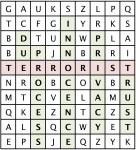Fear. Fear is paradoxically a powerful motivator and pacifier. It compels us to fight back but sometimes can lull us into complacency if we believe such complacency will protect us. It was recently revealed that the NSA been collecting “metadata” from American’s phone conversations and recording the content of our internet usage in a furtive attempt to uncover the word “TERRORIST” in a virtual global-size Word Puzzle.
After this revelation there was much popular indignation. Liberal, libertarian, and conservative – all briefly joined together in outrage that their government would subject them to such scrutiny. We all (naively) believed our internet communications to be private; thus our outrage over such virtual eavesdropping was no different than had the NSA been bugging our bedrooms. Then something happened. The government did not blink. They were not at all shamed by this revelation. In fact all three branches of government defended it on the grounds of safety. Or the illusion of safety anyway. Without the PRISM program (the codename for the internet spying) we might have fallen victim to dozens of terrorist attacks, so they say. The brushfire of outrage was all but quenched with the bucket of our own fear – “well I guess it’s ok if it will keep us safe” now says John Q. Public.
How many violations of our liberty will we accept to keep us safe? Since we generally value our lives more than anything else it is safe to say we will tolerate quite a bit. And those in power know this. That is why historically such appeals to “protecting the people” have always been the siren call of despotic regimes intent on accruing more and more power to themselves. Such appeals to “safety” give them a carte blanche to inflict just about any measure of control over the citizenry. The trick though is that it must be done piecemeal. You would notice a million ants at your front door, but one or two sneaking in under the door each day are hardly noticed at all. Given enough time eventually all the ants are inside and by then it is too late.
Rather apropos was Anton Scalia’s dissent last week in an unrelated case, “Solving unsolved crimes is a noble objective, but it occupies a lower place in the American pantheon of noble objectives than the protection of our people from suspicionless law-enforcement searches.”
Yes indeed we could find more criminals if police could search any house they wanted any time for any reason. If we required every citizen to provide a DNA sample or undergo a psychological evaluation we could prevent many crimes. If we could bug every home, building and car we could surely catch a terrorist or two. But is that the country we want to live in?
We can speak of balancing liberty and privacy but by what non-arbitrary method can one find that balancing midpoint? There is none. The need for safety is always immediate whereas the need for liberty is less exigent; therefore in a contest between the two, liberty tends to lose out. We don’t realize we need liberty it until it is long gone.
But this whole question of balancing the two ignores the elephant in the room. How did we get here? How is it that we have the tiger by the tail? Even though Ron Paul was ridiculed for bringing the question up 6 years ago (as though to merely pose the question is to be guilty of being un-American), we still are not addressing why America is a terrorist target (short answer: our interventionist foreign policy).
If our boat is sinking, the immediacy of safety demands we bail out the water, but perhaps it would be prudent to find the source of the leak instead of focusing all energy on mitigating its effects. Reacting to the effects of something we are willfully blind to is the definition of futility.
